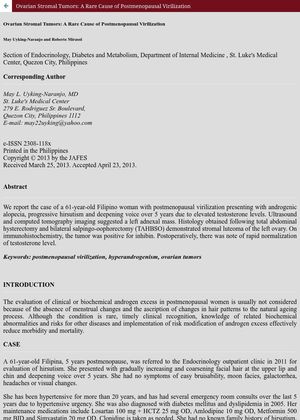TLDR Ovarian stromal tumors are a rare cause of women developing male characteristics after menopause.
The document "Ovarian Stromal Tumors: A Rare Cause of Postmenopausal Virilization" from 2013 discussed a rare cause of postmenopausal virilization, which is the development of male characteristics in females, typically due to increased androgen levels. The study focused on ovarian stromal tumors, which were identified as a rare cause of this condition. The document did not provide specific numbers regarding the prevalence of this condition or the number of individuals studied, making it difficult to assess the strength of the study. The document emphasized the rarity of ovarian stromal tumors causing postmenopausal virilization, but did not provide further details or conclusions.
 63 citations
,
March 2011 in “Clinical Endocrinology”
63 citations
,
March 2011 in “Clinical Endocrinology” Evaluate postmenopausal women with high androgen levels using medical history, physical exams, lab tests, and imaging to manage health risks.
 815 citations
,
April 2010 in “The Journal of Clinical Endocrinology & Metabolism”
815 citations
,
April 2010 in “The Journal of Clinical Endocrinology & Metabolism” Women with PCOS should be screened for heart disease risk and manage their health to prevent it.
502 citations
,
February 2008 in “The Journal of Clinical Endocrinology & Metabolism” Treat significant hirsutism with medication and hair removal; use birth control pills first, adding antiandrogens if needed.
 3 citations
,
February 2018 in “Journal of evolution of medical and dental sciences”
3 citations
,
February 2018 in “Journal of evolution of medical and dental sciences” Some ovarian tumors can cause masculinization, and it's important to check for various causes when this symptom is present.
 December 2021 in “Aegean journal of obstetrics and gynecology”
December 2021 in “Aegean journal of obstetrics and gynecology” A woman's male-like physical changes were caused by two rare ovarian conditions.
 5 citations
,
January 2017 in “Acta Endocrinologica”
5 citations
,
January 2017 in “Acta Endocrinologica” High androgen levels in postmenopausal women may suggest an ovarian tumor, and removing it can improve heart and metabolic health.
 December 2013 in “Macedonian Journal of Medical Sciences”
December 2013 in “Macedonian Journal of Medical Sciences” Ovarian steroid cell tumors should be considered in adults with hirsutism and high testosterone, with surgery as the main treatment.
 20 citations
,
October 2017 in “Clinical Endocrinology”
20 citations
,
October 2017 in “Clinical Endocrinology” The conclusion is that removing both ovaries is the best treatment for excess male hormones in postmenopausal women, with medication as another option, and managing insulin resistance is important for diagnosis and treatment.







